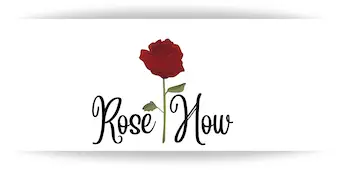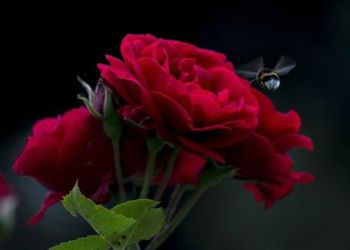If you’re thinking about planting roses (or if you already have some), you might be curious about the pollinators they attract. In particular, do roses attract bees?
Perhaps someone in your family suffers from a bee allergy, and you’re attempting to keep bees out of your garden. Or you want to attract beautiful pollinators like butterflies, ladybugs, and bees to liven up your landscape.
Here’s the short answer, then we’ll get into more detail.
Bees are attracted to the shape, color, and fragrance of roses to gather nectar and pollen. However, the nectar and fragrance that roses produce vary and are a major factor. Most roses produce very little nectar, so there isn’t much for the bees to gather. But, bees will still come to pollinate them.
Rose petals also release a chemical that attracts bees. Roses have a unique aroma that attracts bees despite the rewards being less than that of many other flowers.
Coumarin is the chemical name for the compound that attracts bees. It has health-promoting properties and is also used in herbal medicine.
But if the nectar rewards are minimal, why would bees bother visiting a rose?
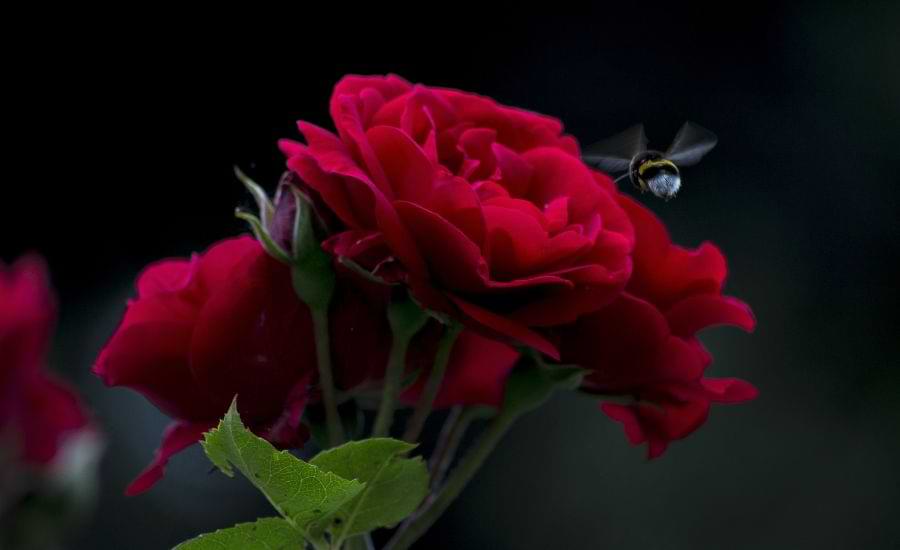
What attracts bees to roses?
Bees are drawn to roses, flowers, and plants in general for a variety of reasons. It’s primarily for pollen and nectar. They are instinctively drawn in by the color, shape, fragrance, and other characteristics.
One of the most essential characteristics that attract bees to roses is color. So do roses attract bees based on color?
Multiple colored roses attract bees more effectively. Bees cannot see the color red. So this is why red roses do not attract bees as much as other colors.
When bees are foraging, they fly extremely quickly. This is also one of the reasons why bees are attracted to bright colors.
Green flowers in a field of green grass aren’t particularly attractive to bees, but blue and violet colors, in particular, do stand out to them.
If you want to attract bees go for colors that stand out (but not red!).
The best color for roses (and other plants) to look for are bright colors, as bees perceive darker colors as threats. Roses in shades of blue, violet, and even white work well.
Consider the background too. White roses may not stand out as much against a white fence for example.
TIP: If you’re looking to attract bees there are other ways of doing this. Check my companion plants lit for companion plants that attract pollinators, or plant something like sunflowers … bees love sunflowers!
Shape
Another important element that attracts bees to roses is their form. Regarding the size of bees, the shape of the flower is significant.
Do roses attract bees? Well, bigger petals will attract bigger bees, and, you guessed it, smaller petals would generally attract smaller bees.
Another explanation for the shape’s significance is the way bees consume nectar. Because they use their long tongue to extract nectar, certain bees prefer flowers with an oblong shape.
Essentially, bees like a good landing pad and easy-to-reach nectar!
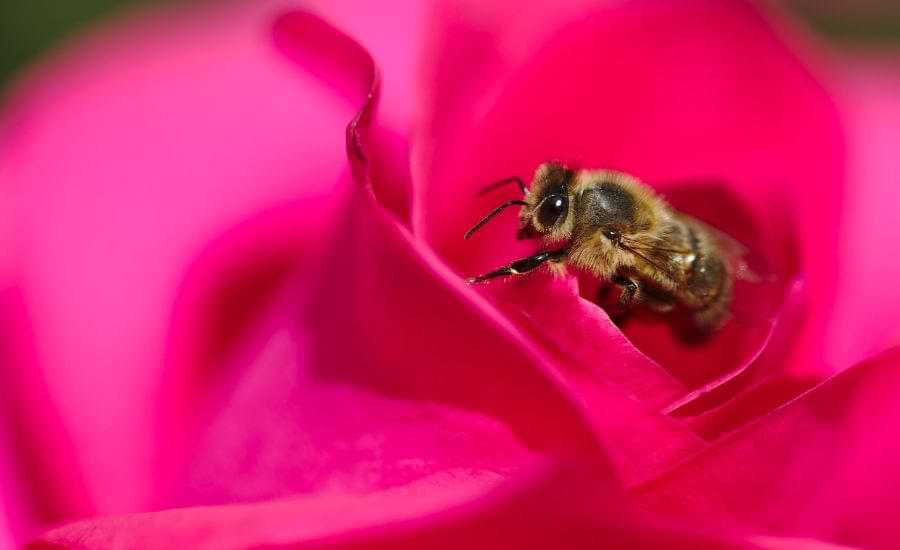
Nectar and pollen
Do roses attract bees for nectar and pollen?
While most roses do not release large quantities of nectar, there are a few that do.
Pollen, however, is produced by all of them and bees need pollen too. Plus they use it to feed bee larvae. A nectar-rich rose implies a bee may get the nutrition it requires.
Bees consume nectar to make honey, they require nectar to survive and are generally drawn to flowers with the highest nectar concentration.
Which roses are the most attractive to bees?
Roses come in a variety of colors and shapes. So it’s helpful to know which plants attract bees the most if you wish to attract them.
Depending on their size and color, different flowers will appeal to different bees. The following are some of the best roses for attracting bees:
Wild roses: Wild roses contain a higher number of flowers and are quite vibrant, making them an excellent choice for attracting bees.
English roses: Bees are attracted to English roses because they contain a lot of petals and easy access to pollen.
Hybrid tea roses: Hybrid tea roses do not have as many petals as English roses, and their scent is less. However, they are nonetheless quite attractive among bees due to their multiple colors.
Here’s more information on the above rose categories.
I’ve been asked before about knock out® roses and whether they attract bees.
Do Knock Out® roses attract bees?
Knockout roses are not the best plant, or rose, for attracting bees. Despite their many benefits and ideal colors, they produce very little nectar because they are hybridized roses. Their fragrance is lower, and double knockout roses also make it difficult for bees to access any available pollen.
Like many rose varieties, the color of knock out® roses will attract bees, but they may not return for multiple visits as there are likely easier targets around the garden to gather nectar from.
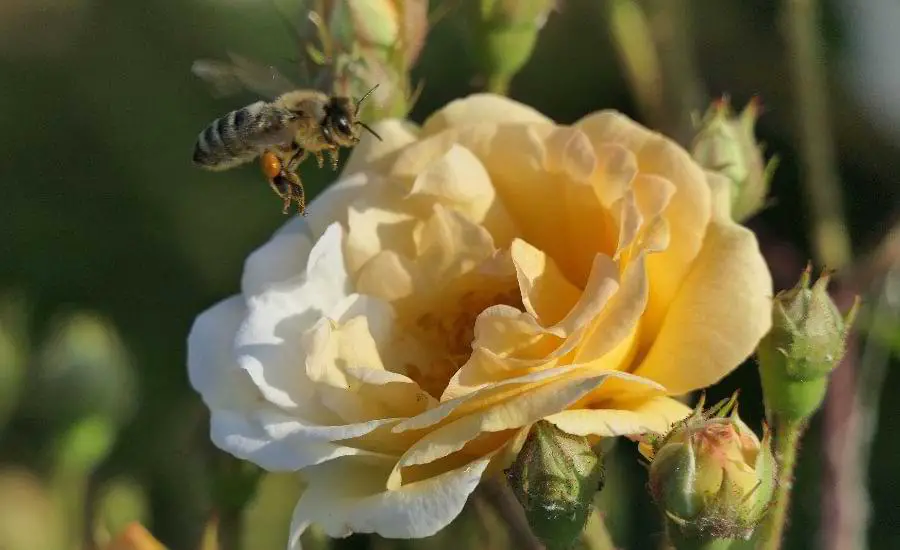
How to make your roses bee-friendly
Remember, that even though roses may not be the bees’ ideal target, they will still visit. And there are things you can do to encourage them further. The primary one is companion planting.
Companion planting
You can make up for what is lacking in your roses by selecting companion plants to add around your roses that will attract bees. I have an entire article around companion planting for roses and which plants attract pollinators here.
Suffice to say, plants such as Lavender, Basil, Zinnia, Bee balm, and Alyssum are all good plants to attract pollinators of various kinds. Check out the article and the help table mentioned above for more information on this.
Once you’ve done this, there are other ways you can attract bees to your roses and ways that may help. I’ll cover those next.
Watering
Always remember to water your roses. Watering your rose is essential to keeping it healthy and vibrant, of course. And they can be thirsty plants at times! Here’s more on when you need to water your roses.
When watering, make sure to pour the water on the soil around the plant rather than over the leaves.
This will make it easier for the plant to absorb water and lower the danger of an infestation.
You may help your rose thrive by giving it some supplementary feedings in addition to watering. Choose a spot for your roses that receives enough sunlight. A good 6 hours of sunlight is required daily for roses to bloom.
Pruning
Pruning your roses is always a good idea and you can absolutely do this at any time.
Pruning diverts more energy to the rose toward producing more blooms. This will attract more bees once the rose is in better “shape.” Pruning is crucial for keeping your roses healthy.
When pruning your rose bush, remove all the extraneous parts. It’s all about maintaining them free of unwanted growth. If you water your rose properly and prune it regularly, it will grow into a healthy plant that blooms all year.
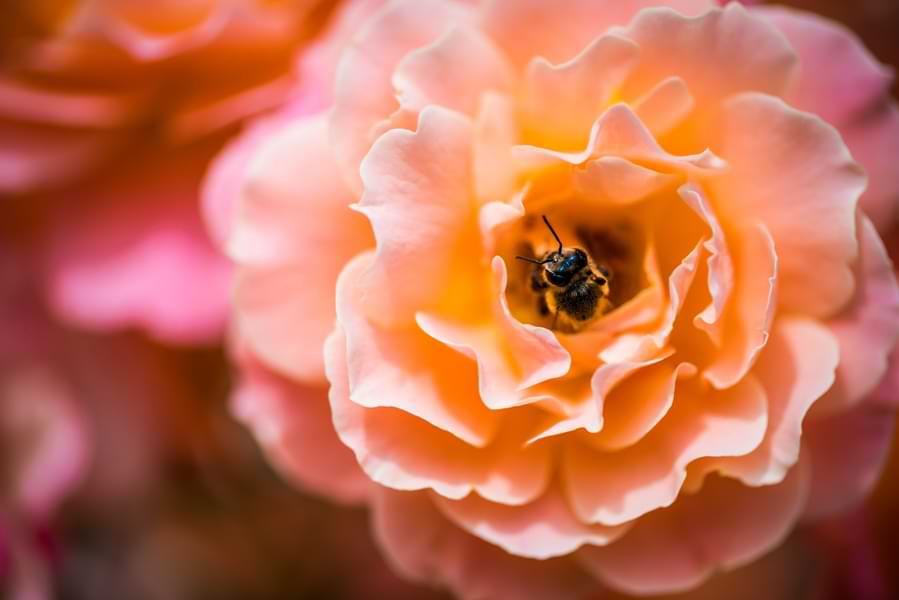
Use fertilizer
Before planting, you might want to add some organic compost to the soil. This will not only enrich your soil, but it will also attract earthworms, which are excellent for oxygenation and spreading nutrients around in the soil for healthy roses.
Even though roses can grow quite adequately on their own. Fertilization is a common part of the rose-growing process. Fertilizers help them grow faster, thereby producing stronger plants, with more blooms for bees. But do not overfertilize them. You want to avoid roses growing too fast, and becoming “spindly”!
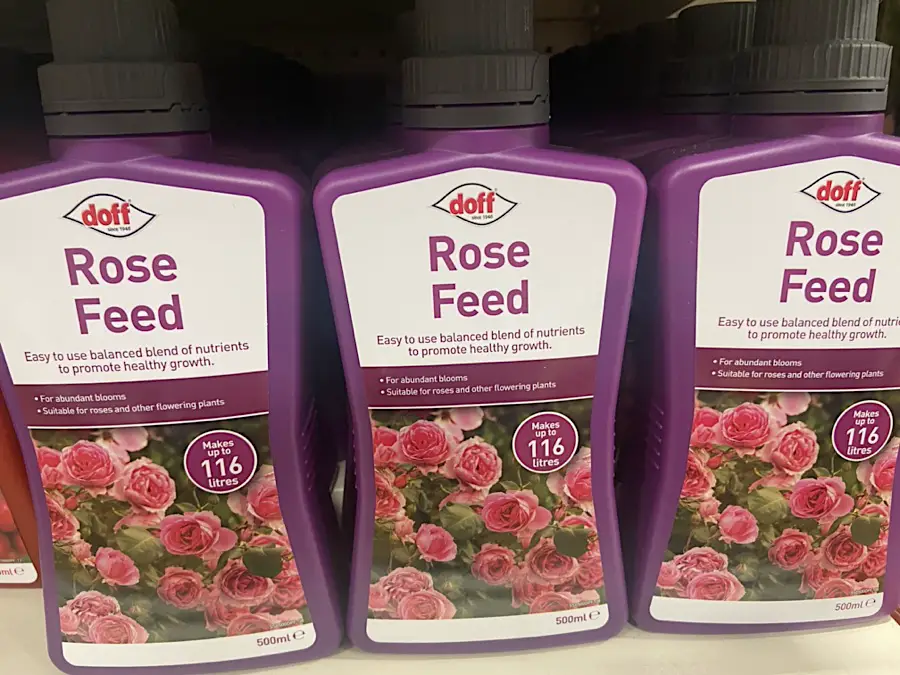
Fertilizers give roses a boost of the nourishment they need to thrive. Nitrogen, phosphorus, and potassium are among these nutrients. These have an impact on the plant’s ability to synthesize chlorophyll, which is essential for photosynthesis.
These nutrients are absorbed by roses through their roots. During the early stages of growth, roses require nitrogen, phosphorus for robust roots, and potassium for disease resistance – which can also help deter ants.
Because there are so many various types of fertilizer on the market now, it’s crucial to pick one that’s right for your rose. Organic and inorganic fertilizers are both readily available on the market.
Assess what other treatments you can add to your roses. You’ll find lots of options – including organic options – in my treatments section.
Do roses attract bees? ~ More roses help!
Roses are arguably the most well-known flower in the world, and rightly so…
They’re beautiful, come in a variety of colors, and have a romantic allure that makes them a good addition to any garden. They’re also relatively simple to grow and maintain – And, they will attract some bees.
So I hope this has helped. Be sure to check out my tools and resources page to grow great roses. And check out some of the recent articles below.
Do Roses Attract Ants? Why, When, and How to Deal With Them
Do Roses Attract Snakes? When, Why, and How to Deter Them

Hi, I’m Michael. My passion for roses was sparked a few years ago after visiting a dedicated community rose garden. So Rosehow.com represents my take, my learnings, and my help for anyone looking to grow, be proud of, and harvest roses.
